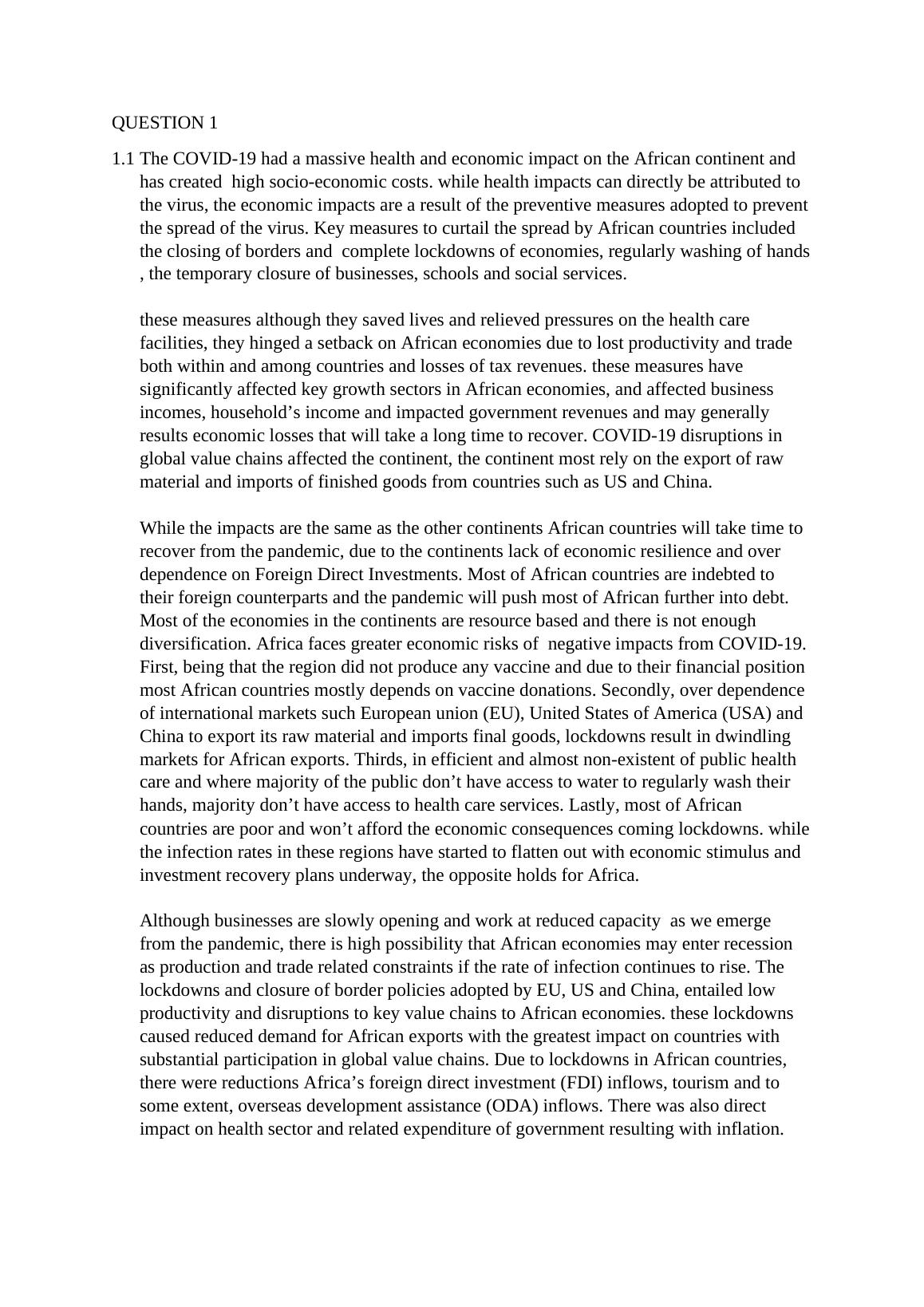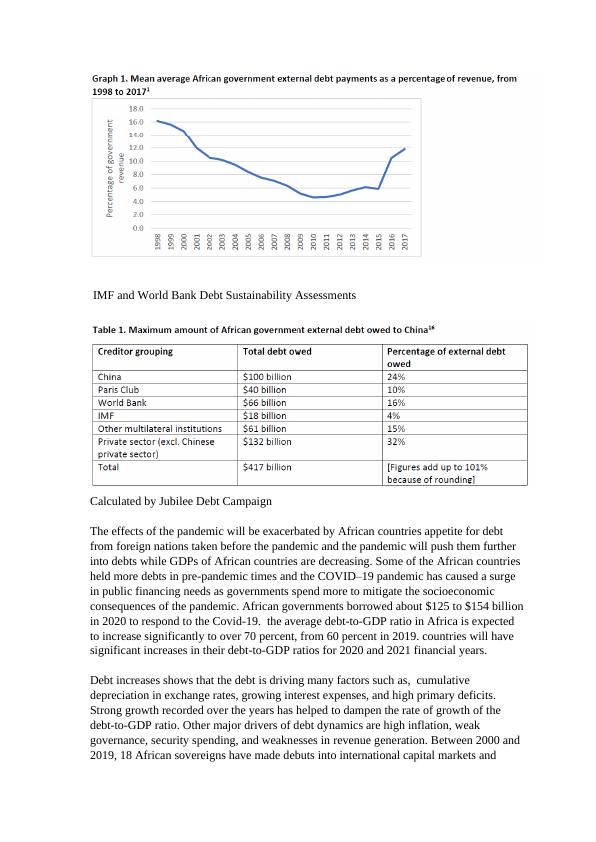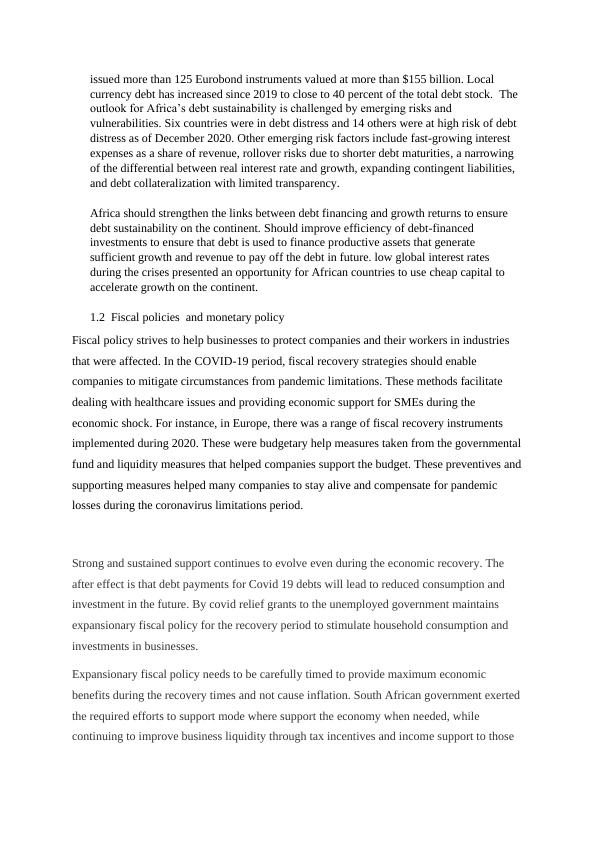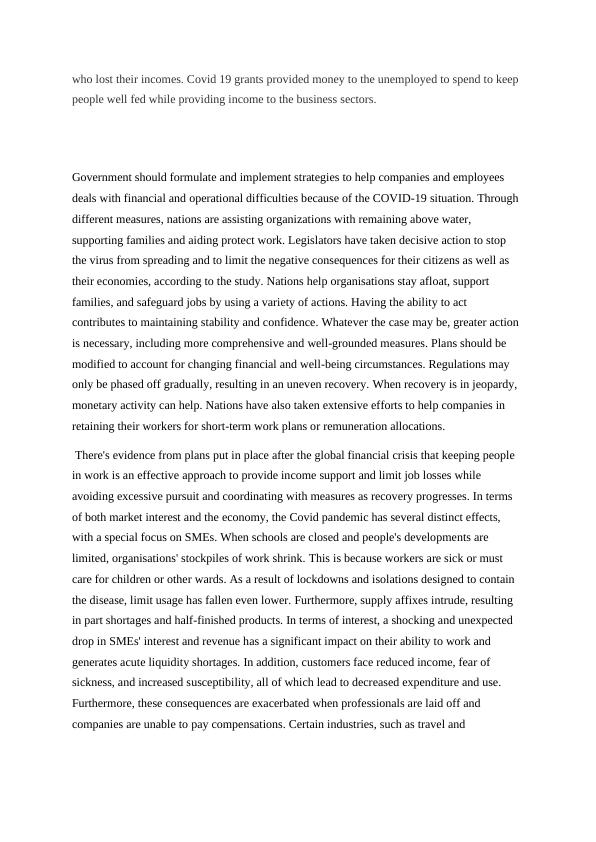The COVID-19 Question and Answer 2022
Added on 2022-11-18
15 Pages5107 Words16 Views
QUESTION 1
1.1 The COVID-19 had a massive health and economic impact on the African continent and
has created high socio-economic costs. while health impacts can directly be attributed to
the virus, the economic impacts are a result of the preventive measures adopted to prevent
the spread of the virus. Key measures to curtail the spread by African countries included
the closing of borders and complete lockdowns of economies, regularly washing of hands
, the temporary closure of businesses, schools and social services.
these measures although they saved lives and relieved pressures on the health care
facilities, they hinged a setback on African economies due to lost productivity and trade
both within and among countries and losses of tax revenues. these measures have
significantly affected key growth sectors in African economies, and affected business
incomes, household’s income and impacted government revenues and may generally
results economic losses that will take a long time to recover. COVID-19 disruptions in
global value chains affected the continent, the continent most rely on the export of raw
material and imports of finished goods from countries such as US and China.
While the impacts are the same as the other continents African countries will take time to
recover from the pandemic, due to the continents lack of economic resilience and over
dependence on Foreign Direct Investments. Most of African countries are indebted to
their foreign counterparts and the pandemic will push most of African further into debt.
Most of the economies in the continents are resource based and there is not enough
diversification. Africa faces greater economic risks of negative impacts from COVID-19.
First, being that the region did not produce any vaccine and due to their financial position
most African countries mostly depends on vaccine donations. Secondly, over dependence
of international markets such European union (EU), United States of America (USA) and
China to export its raw material and imports final goods, lockdowns result in dwindling
markets for African exports. Thirds, in efficient and almost non-existent of public health
care and where majority of the public don’t have access to water to regularly wash their
hands, majority don’t have access to health care services. Lastly, most of African
countries are poor and won’t afford the economic consequences coming lockdowns. while
the infection rates in these regions have started to flatten out with economic stimulus and
investment recovery plans underway, the opposite holds for Africa.
Although businesses are slowly opening and work at reduced capacity as we emerge
from the pandemic, there is high possibility that African economies may enter recession
as production and trade related constraints if the rate of infection continues to rise. The
lockdowns and closure of border policies adopted by EU, US and China, entailed low
productivity and disruptions to key value chains to African economies. these lockdowns
caused reduced demand for African exports with the greatest impact on countries with
substantial participation in global value chains. Due to lockdowns in African countries,
there were reductions Africa’s foreign direct investment (FDI) inflows, tourism and to
some extent, overseas development assistance (ODA) inflows. There was also direct
impact on health sector and related expenditure of government resulting with inflation.
1.1 The COVID-19 had a massive health and economic impact on the African continent and
has created high socio-economic costs. while health impacts can directly be attributed to
the virus, the economic impacts are a result of the preventive measures adopted to prevent
the spread of the virus. Key measures to curtail the spread by African countries included
the closing of borders and complete lockdowns of economies, regularly washing of hands
, the temporary closure of businesses, schools and social services.
these measures although they saved lives and relieved pressures on the health care
facilities, they hinged a setback on African economies due to lost productivity and trade
both within and among countries and losses of tax revenues. these measures have
significantly affected key growth sectors in African economies, and affected business
incomes, household’s income and impacted government revenues and may generally
results economic losses that will take a long time to recover. COVID-19 disruptions in
global value chains affected the continent, the continent most rely on the export of raw
material and imports of finished goods from countries such as US and China.
While the impacts are the same as the other continents African countries will take time to
recover from the pandemic, due to the continents lack of economic resilience and over
dependence on Foreign Direct Investments. Most of African countries are indebted to
their foreign counterparts and the pandemic will push most of African further into debt.
Most of the economies in the continents are resource based and there is not enough
diversification. Africa faces greater economic risks of negative impacts from COVID-19.
First, being that the region did not produce any vaccine and due to their financial position
most African countries mostly depends on vaccine donations. Secondly, over dependence
of international markets such European union (EU), United States of America (USA) and
China to export its raw material and imports final goods, lockdowns result in dwindling
markets for African exports. Thirds, in efficient and almost non-existent of public health
care and where majority of the public don’t have access to water to regularly wash their
hands, majority don’t have access to health care services. Lastly, most of African
countries are poor and won’t afford the economic consequences coming lockdowns. while
the infection rates in these regions have started to flatten out with economic stimulus and
investment recovery plans underway, the opposite holds for Africa.
Although businesses are slowly opening and work at reduced capacity as we emerge
from the pandemic, there is high possibility that African economies may enter recession
as production and trade related constraints if the rate of infection continues to rise. The
lockdowns and closure of border policies adopted by EU, US and China, entailed low
productivity and disruptions to key value chains to African economies. these lockdowns
caused reduced demand for African exports with the greatest impact on countries with
substantial participation in global value chains. Due to lockdowns in African countries,
there were reductions Africa’s foreign direct investment (FDI) inflows, tourism and to
some extent, overseas development assistance (ODA) inflows. There was also direct
impact on health sector and related expenditure of government resulting with inflation.

IMF and World Bank Debt Sustainability Assessments
Calculated by Jubilee Debt Campaign
The effects of the pandemic will be exacerbated by African countries appetite for debt
from foreign nations taken before the pandemic and the pandemic will push them further
into debts while GDPs of African countries are decreasing. Some of the African countries
held more debts in pre-pandemic times and the COVID–19 pandemic has caused a surge
in public financing needs as governments spend more to mitigate the socioeconomic
consequences of the pandemic. African governments borrowed about $125 to $154 billion
in 2020 to respond to the Covid-19. the average debt-to-GDP ratio in Africa is expected
to increase significantly to over 70 percent, from 60 percent in 2019. countries will have
significant increases in their debt-to-GDP ratios for 2020 and 2021 financial years.
Debt increases shows that the debt is driving many factors such as, cumulative
depreciation in exchange rates, growing interest expenses, and high primary deficits.
Strong growth recorded over the years has helped to dampen the rate of growth of the
debt-to-GDP ratio. Other major drivers of debt dynamics are high inflation, weak
governance, security spending, and weaknesses in revenue generation. Between 2000 and
2019, 18 African sovereigns have made debuts into international capital markets and
Calculated by Jubilee Debt Campaign
The effects of the pandemic will be exacerbated by African countries appetite for debt
from foreign nations taken before the pandemic and the pandemic will push them further
into debts while GDPs of African countries are decreasing. Some of the African countries
held more debts in pre-pandemic times and the COVID–19 pandemic has caused a surge
in public financing needs as governments spend more to mitigate the socioeconomic
consequences of the pandemic. African governments borrowed about $125 to $154 billion
in 2020 to respond to the Covid-19. the average debt-to-GDP ratio in Africa is expected
to increase significantly to over 70 percent, from 60 percent in 2019. countries will have
significant increases in their debt-to-GDP ratios for 2020 and 2021 financial years.
Debt increases shows that the debt is driving many factors such as, cumulative
depreciation in exchange rates, growing interest expenses, and high primary deficits.
Strong growth recorded over the years has helped to dampen the rate of growth of the
debt-to-GDP ratio. Other major drivers of debt dynamics are high inflation, weak
governance, security spending, and weaknesses in revenue generation. Between 2000 and
2019, 18 African sovereigns have made debuts into international capital markets and

issued more than 125 Eurobond instruments valued at more than $155 billion. Local
currency debt has increased since 2019 to close to 40 percent of the total debt stock. The
outlook for Africa’s debt sustainability is challenged by emerging risks and
vulnerabilities. Six countries were in debt distress and 14 others were at high risk of debt
distress as of December 2020. Other emerging risk factors include fast-growing interest
expenses as a share of revenue, rollover risks due to shorter debt maturities, a narrowing
of the differential between real interest rate and growth, expanding contingent liabilities,
and debt collateralization with limited transparency.
Africa should strengthen the links between debt financing and growth returns to ensure
debt sustainability on the continent. Should improve efficiency of debt-financed
investments to ensure that debt is used to finance productive assets that generate
sufficient growth and revenue to pay off the debt in future. low global interest rates
during the crises presented an opportunity for African countries to use cheap capital to
accelerate growth on the continent.
1.2 Fiscal policies and monetary policy
Fiscal policy strives to help businesses to protect companies and their workers in industries
that were affected. In the COVID-19 period, fiscal recovery strategies should enable
companies to mitigate circumstances from pandemic limitations. These methods facilitate
dealing with healthcare issues and providing economic support for SMEs during the
economic shock. For instance, in Europe, there was a range of fiscal recovery instruments
implemented during 2020. These were budgetary help measures taken from the governmental
fund and liquidity measures that helped companies support the budget. These preventives and
supporting measures helped many companies to stay alive and compensate for pandemic
losses during the coronavirus limitations period.
Strong and sustained support continues to evolve even during the economic recovery. The
after effect is that debt payments for Covid 19 debts will lead to reduced consumption and
investment in the future. By covid relief grants to the unemployed government maintains
expansionary fiscal policy for the recovery period to stimulate household consumption and
investments in businesses.
Expansionary fiscal policy needs to be carefully timed to provide maximum economic
benefits during the recovery times and not cause inflation. South African government exerted
the required efforts to support mode where support the economy when needed, while
continuing to improve business liquidity through tax incentives and income support to those
currency debt has increased since 2019 to close to 40 percent of the total debt stock. The
outlook for Africa’s debt sustainability is challenged by emerging risks and
vulnerabilities. Six countries were in debt distress and 14 others were at high risk of debt
distress as of December 2020. Other emerging risk factors include fast-growing interest
expenses as a share of revenue, rollover risks due to shorter debt maturities, a narrowing
of the differential between real interest rate and growth, expanding contingent liabilities,
and debt collateralization with limited transparency.
Africa should strengthen the links between debt financing and growth returns to ensure
debt sustainability on the continent. Should improve efficiency of debt-financed
investments to ensure that debt is used to finance productive assets that generate
sufficient growth and revenue to pay off the debt in future. low global interest rates
during the crises presented an opportunity for African countries to use cheap capital to
accelerate growth on the continent.
1.2 Fiscal policies and monetary policy
Fiscal policy strives to help businesses to protect companies and their workers in industries
that were affected. In the COVID-19 period, fiscal recovery strategies should enable
companies to mitigate circumstances from pandemic limitations. These methods facilitate
dealing with healthcare issues and providing economic support for SMEs during the
economic shock. For instance, in Europe, there was a range of fiscal recovery instruments
implemented during 2020. These were budgetary help measures taken from the governmental
fund and liquidity measures that helped companies support the budget. These preventives and
supporting measures helped many companies to stay alive and compensate for pandemic
losses during the coronavirus limitations period.
Strong and sustained support continues to evolve even during the economic recovery. The
after effect is that debt payments for Covid 19 debts will lead to reduced consumption and
investment in the future. By covid relief grants to the unemployed government maintains
expansionary fiscal policy for the recovery period to stimulate household consumption and
investments in businesses.
Expansionary fiscal policy needs to be carefully timed to provide maximum economic
benefits during the recovery times and not cause inflation. South African government exerted
the required efforts to support mode where support the economy when needed, while
continuing to improve business liquidity through tax incentives and income support to those

who lost their incomes. Covid 19 grants provided money to the unemployed to spend to keep
people well fed while providing income to the business sectors.
Government should formulate and implement strategies to help companies and employees
deals with financial and operational difficulties because of the COVID-19 situation. Through
different measures, nations are assisting organizations with remaining above water,
supporting families and aiding protect work. Legislators have taken decisive action to stop
the virus from spreading and to limit the negative consequences for their citizens as well as
their economies, according to the study. Nations help organisations stay afloat, support
families, and safeguard jobs by using a variety of actions. Having the ability to act
contributes to maintaining stability and confidence. Whatever the case may be, greater action
is necessary, including more comprehensive and well-grounded measures. Plans should be
modified to account for changing financial and well-being circumstances. Regulations may
only be phased off gradually, resulting in an uneven recovery. When recovery is in jeopardy,
monetary activity can help. Nations have also taken extensive efforts to help companies in
retaining their workers for short-term work plans or remuneration allocations.
There's evidence from plans put in place after the global financial crisis that keeping people
in work is an effective approach to provide income support and limit job losses while
avoiding excessive pursuit and coordinating with measures as recovery progresses. In terms
of both market interest and the economy, the Covid pandemic has several distinct effects,
with a special focus on SMEs. When schools are closed and people's developments are
limited, organisations' stockpiles of work shrink. This is because workers are sick or must
care for children or other wards. As a result of lockdowns and isolations designed to contain
the disease, limit usage has fallen even lower. Furthermore, supply affixes intrude, resulting
in part shortages and half-finished products. In terms of interest, a shocking and unexpected
drop in SMEs' interest and revenue has a significant impact on their ability to work and
generates acute liquidity shortages. In addition, customers face reduced income, fear of
sickness, and increased susceptibility, all of which lead to decreased expenditure and use.
Furthermore, these consequences are exacerbated when professionals are laid off and
companies are unable to pay compensations. Certain industries, such as travel and
people well fed while providing income to the business sectors.
Government should formulate and implement strategies to help companies and employees
deals with financial and operational difficulties because of the COVID-19 situation. Through
different measures, nations are assisting organizations with remaining above water,
supporting families and aiding protect work. Legislators have taken decisive action to stop
the virus from spreading and to limit the negative consequences for their citizens as well as
their economies, according to the study. Nations help organisations stay afloat, support
families, and safeguard jobs by using a variety of actions. Having the ability to act
contributes to maintaining stability and confidence. Whatever the case may be, greater action
is necessary, including more comprehensive and well-grounded measures. Plans should be
modified to account for changing financial and well-being circumstances. Regulations may
only be phased off gradually, resulting in an uneven recovery. When recovery is in jeopardy,
monetary activity can help. Nations have also taken extensive efforts to help companies in
retaining their workers for short-term work plans or remuneration allocations.
There's evidence from plans put in place after the global financial crisis that keeping people
in work is an effective approach to provide income support and limit job losses while
avoiding excessive pursuit and coordinating with measures as recovery progresses. In terms
of both market interest and the economy, the Covid pandemic has several distinct effects,
with a special focus on SMEs. When schools are closed and people's developments are
limited, organisations' stockpiles of work shrink. This is because workers are sick or must
care for children or other wards. As a result of lockdowns and isolations designed to contain
the disease, limit usage has fallen even lower. Furthermore, supply affixes intrude, resulting
in part shortages and half-finished products. In terms of interest, a shocking and unexpected
drop in SMEs' interest and revenue has a significant impact on their ability to work and
generates acute liquidity shortages. In addition, customers face reduced income, fear of
sickness, and increased susceptibility, all of which lead to decreased expenditure and use.
Furthermore, these consequences are exacerbated when professionals are laid off and
companies are unable to pay compensations. Certain industries, such as travel and

End of preview
Want to access all the pages? Upload your documents or become a member.
Related Documents
Impact of COVID-19 on the Value of AUDlg...
|11
|3248
|84
Impact Could Cause Equivalent Of 195 Million Job Losseslg...
|6
|2156
|29
STRATEGIES AND MEASURES AGAINST THE EPIDEMIC-COVID19 REPORT 2022lg...
|7
|4437
|25
(solved) INF4883 2020 Assignmentlg...
|8
|1694
|355
Challenges of Hospitality, Leisure and Travel Industry During COVID-19 Pandemiclg...
|7
|1790
|299
Impact of COVID 19 on Healthcare, Economy and Social Life in UKlg...
|11
|1449
|490
